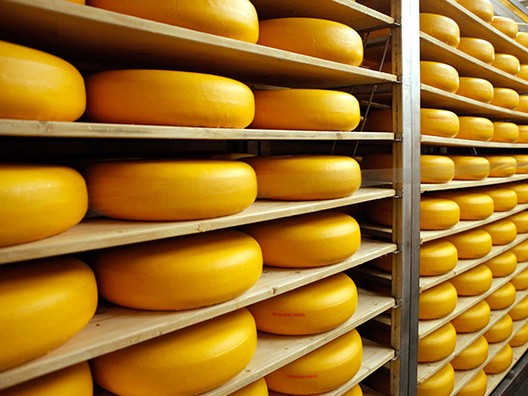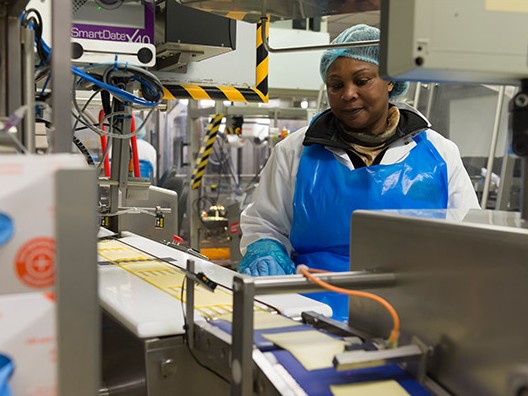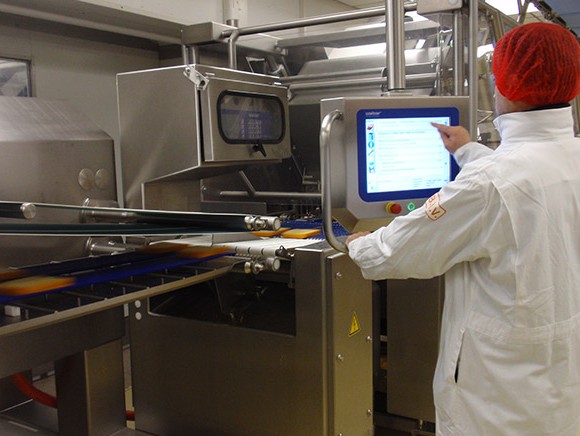
Vergeer Holland is proof that innovation is always possible, even with a traditional product such as cheese. The company’s product range is evolving all the time, and so too it its workforce: employees have plenty of opportunity to not only share knowledge, but also – and above all – to acquire it. The latter is achieved with help from food-sector training institute SVO.
Vergeer Holland, a family-run company founded back in 1934, takes a clear-cut approach to business: responding to market needs quickly and flexibly but without compromising on quality and hygiene. Everything meets the very highest standards; for Vergeer Holland, quality is not merely about the end result but is instead an ongoing process of change and improvement. “Of course we ensure that we comply with the relevant standards and criteria year after year, but we also remain critical of ourselves and continue to raise the bar a little higher every time. The same applies to our workforce. Vergeer Holland employs 550 people across four locations. We are happy to give them the opportunity to work on their personal and professional development,” says Harrie Groenendijk, Health & Safety and Training Coordinator at Vergeer Holland. “This helps us to be an attractive employer, including for young new arrivals on the labour market. Moreover, we are keen to be able to demonstrate to our customers that Vergeer Holland is focused on the skill level of its workforce.”
While Groenendijk shows us the extensive training plan for production employees, which include a significant number of operators (135 in total), he continues: “We’ve been working with this approach for nearly five years now. Needless to say we provided some training and refresher courses before that, but nowadays it is structurally embedded in our organisation. The benefits of raising employees’ knowledge level and improving their general development include better communication, a better understanding of the company and greater involvement. This results in a positive evolution of the company culture.” Vergeer Holland outsources much of its training to the food-sector training institute SVO. The vocational competence profiles have been written specifically for the cheese-processing industry, and the MBO (officially recognised vocational) courses are aligned with these. Hans de Mooij, Key Account Manager at SVO, sums up the mission succinctly: “We do what we’re best at in the segments that we know through and through, with the following aim: developing skilled professionals who also understand the products.”
When tackling a customer’s training issue, SVO takes the practical situation into account. Hence, all MBO training courses are evaluated by stakeholders in the sector. The lecturers and trainers are familiar with the real-life needs within the industry and they work closely with other specialists such as technical training institute ROVC. SVO works for customers in various segments of the food industry, from fresh-food specialists and the food processing sector to supermarkets and out-of-home/fast-service companies.

Harrie Groenendijk: “Training is essential to achieve efficient business processes. Employees increasingly need to be able to demonstrate that they are proficient in all aspects of their job. By raising the level of our employees’ professional knowledge, we want to improve the OEE figures, reduce downtime and improve quality, such as by reducing the number of complaints and raising the customer satisfaction level. On-the-job training is aimed at employees learning to operate the equipment as efficiently as possible. That too improves results and decreases downtime. New employees receive machinery training from experienced operators. Here, you truly see talents being given room to flourish.”
Hans de Mooij, SVO: “By investing in training, our customers invest in their company and in their staff. The rewards are considerable: better products, more in-depth product knowledge, greater customer satisfaction and fewer complaints. In turn, that has a financial impact: higher productivity, less absenteeism, lower labour costs and higher turnover and profit. One customer hit the nail on the head, saying: ‘Failure to provide training costs a fortune’. Training ‘does something’ with employees, so they also give you something in return. Providing training increases employees’ involvement and sense of responsibility, which has a positive effect on staff retention.”
Harrie: “Yes, that’s true. But that’s what the MBO courses are for. We’ve noticed that they make our people more self-aware: they start asking more questions and suggesting solutions to problems. The MBO course is not compulsory for our operators – some of them are older and extremely good at what they do, and they don’t want to follow anymore training courses. Our aim is for 80% of our operators to complete the course. Word has got round quickly since we started, so we don’t need to do a lot to promote it. The last time we ran a training group, 35 operators signed up voluntarily. We’re already at around 40% so I think we’ll reach the 80%.”

Harrie: “Before an employee can join the voluntary MBO training course they first of all need approval from their departmental manager. Needless to say, we take motivation and language skills into account: better proficiency in the Dutch language improves communication and mutual understanding, and hence also has a direct impact on the production results. Candidates must meet certain minimum requirements at the start of the training – Food Industry Assistant (VA): 1F; Food Industry Operator (VO): 2F; Assistant Foreman in the Food Industry (MWV): 2F+.”
Hans: “Yes, although there are preconditions. The management must regard the training as essential and of added value for the company and its staff, both now and – above all – in the future. There must be enough opportunities to allow the employees to attend certain courses during work time or partially during work time. That means being flexible enough to free up workers for certain amounts of time. It’s also nice if the right resources and facilities are available, such as a classroom or instruction area, trainers, etc. We also believe it is important that the employees who successfully complete a training course are given new opportunities and recognition. Providing real and tangible recognition will act as a stimulus for staff, especially in the case of the MBO courses.”
Harrie: “Our training courses involve the departmental managers and team leaders, any (qualified) practical trainers who might need to be recruited, the training coordinator, the HR department (HR representative for the department concerned), process quality employees, internal instructors for the Vergeer Holland machines, SVO, ROVC and other training institutes. The training courses for production workers, operators and team leaders are held as in-company courses, partly on a voluntary basis (in the employee’s own time). Classical lessons on the MBO courses are attended outside of work time and those hours are not treated as overtime. However, Vergeer Holland does pay the course fees and the employee receives a recognised MBO certificate upon successful completion.”

Hans: “Generally speaking, we take the real-life roles in the industry, both now and in the future, as the starting point for our training courses. Apprenticeship courses are a combination of working and learning. On-the-job learning takes place under the guidance of a practical supervisor; the theoretical lessons are provided by SVO, who also assigns the student a mentor for extra support. For an MBO course, the company must be an accredited ‘learning company’. SVO takes care of arranging accreditation for the company and provides free training to the practical trainer.”
Source: Vergeer Holland